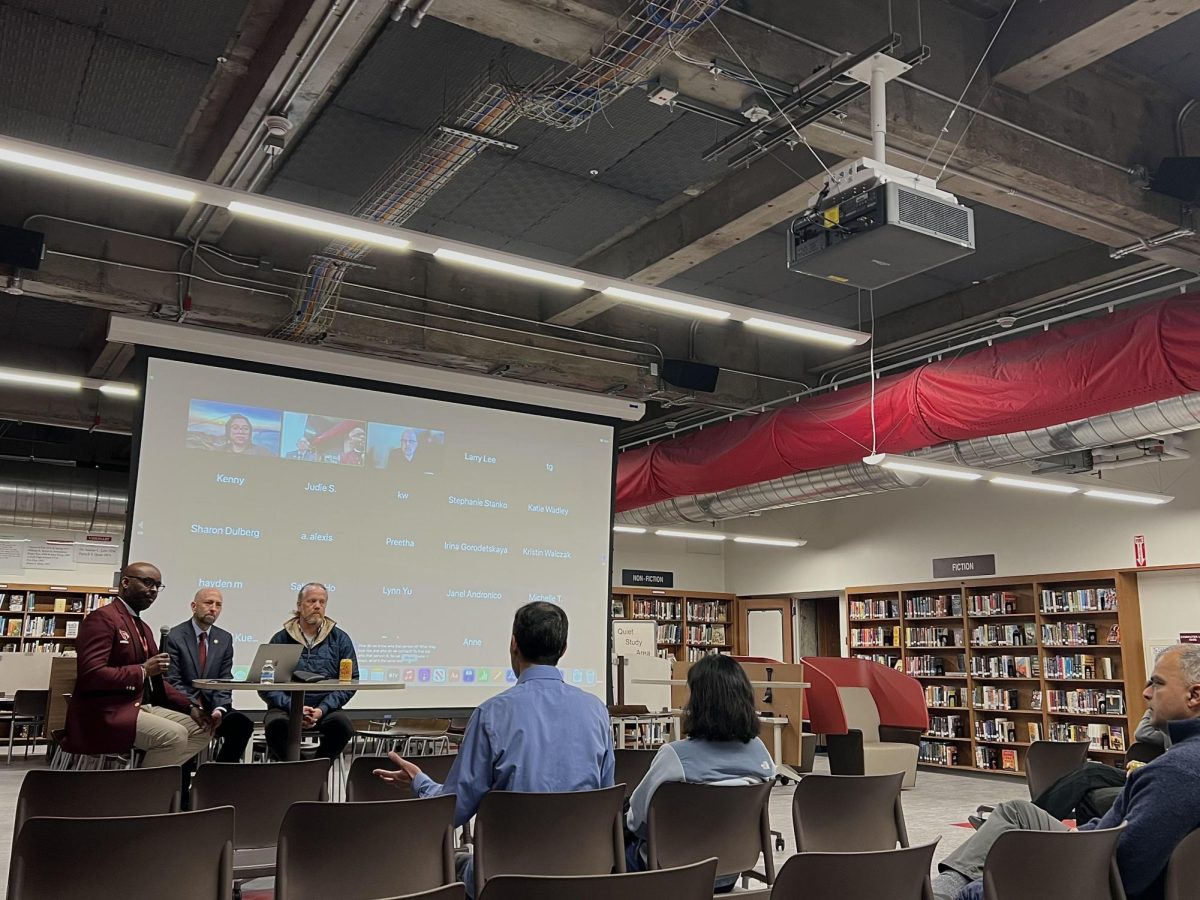
She is the Democrat who represents California’s 14th Congressional District, which spans from the southern corner of San Francisco through San Mateo County to East Palo Alto. She serves on the House Armed Services Committee, the House Permanent Select Committee on Intelligence and the Subcommittee on Oversight and Investigations.
And on Feb. 11, she, Rep. Jackie Speier (D-CA), came to Lowell for a town hall meeting to talk about health care, immigration, foreign relations and sanctuary cities. Her theme was “resist and persist,” urging the hundreds of people sitting in the Carol Channing Theater to be persistent in resisting a Donald Trump presidency. The Parent Teacher Student Association town hall drew in a diverse audience, from as far away as New York, with ages ranging from newborns to senior citizens, with most of the population consisting of middle-aged adults. An overwhelming majority of the crowd appeared to be liberal because most questions expressed concerns that many liberals have.
Here’s an overview and background of the issues Speier discussed during the town hall meeting.

These past few weeks, Speier and most of the other members of the House of Representatives have been holding town halls to get facetime with constituents and gain their favor. In the 2018 midterms, all 435 seats in the House will be contested. So far, several of these town halls, especially those held by Republicans, have been chaotic because of protesters and hecklers, or even cancelled because of security threats.
Sanctuary Cities
The first question of the day was about how much power Trump has over sanctuary cities, which protect undocumented immigrants by limiting their cooperation with the Immigration and Customs Enforcement (ICE), and what sanctuary cities like San Francisco could do to stand up to Trump.
Speier reassured her about her commitment to protect sanctuary cities. Then, she went on to explain that Trump would have little power in denying federal funding for sanctuary cities. Because of the Tenth Amendment, which Speier specifically referenced, leaves all laws not specifically designated to the federal government in the Constitution up to the states. Therefore, she explained, Trump cannot impose his will on sanctuary cities because federal law does not state that local police forces must comply with federal law enforcement bodies such as the ICE. To that, the crowd erupted in applause. “He cannot impose on state and local jurisdictions the responsibility of the federal government,” Speier said. “We also have the Tenth Amendment that leaves all laws not specifically designated to the federal government up to the states.”

Speier emphasized the fact that, in her opinion, sanctuary cities are essential to the America’s identity as a nation built by immigrants. She joked that if Trump really wanted to cut California off, California should in response put its federal taxes into an escrow fund, which would keep federal tax revenue in the state of California and out of federal coffers. She shed light on the fact that California pays more federal taxes than it receives, and in 2005, California paid nearly $50 billion more in federal taxes than it received in federal funds. In fact, in 2015, according to the IRS, California pays the most in federal taxes out of all 50 states, almost $406 billion.
He’d be “lucky to get a green card before [he] dies.”
Immigration
Many audience members voiced their concerns about immigration. One audience member, an Indian-born Stanford PhD graduate who originally came to the U.S. on a student visa and is staying on an H1B worker visa voiced his discontent with America’s tough immigration policies, telling Speier that he’d be “lucky to get a green card before [he] dies.” An H1B visa allows foreign workers in specialty occupations, typically with advanced degrees, to stay in the United States for extended periods of time, but only as long as they stay with the employer that sponsors their H1B. Being that an H1B is a non-immigration, temporary employment visa, once a holder’s H1B expires or they leave their employer, they are by law an unauthorized immigrant. Without a green card, H1B holders other legal immigrants are vulnerable to exploitation, and unable to switch jobs or start their own businesses.
In response, Speier criticized the challenging and long immigration process that H1B visa holders must go through, including up to six months of questioning and application processing. Speier also said she supports legislation that would give graduates of advanced degrees a green card along with fair pay (likely the High-Skilled Integrity and Fairness Act of 2017). This bill was introduced earlier this year in January, and is currently in the process of getting passed.

Lastly, Speier referenced the high percentage, 37 percent to be exact, of Silicon Valley firms whose CEOs and founders are foreign born but educated in America to emphasize the success of America as a nation built on the hard work and innovation of immigrants.

Education
Speier assured the crowd that Betsy DeVos, the new Secretary of Education who supports charter schools and vouchers, had limited authority when it came to K-12 public schooling and that real power lies with state and local governments. Though DeVos will have an impact on the nation’s post-secondary education credentialing and the federal student loan systems, Speier and many of her colleagues will not allow DeVos to “implement her strange ideas,” Speier said.
The issue of guns on campus came up during DeVos’s confirmation hearings, where she voiced support for guns on school campuses so that they can be used to protect kids from grizzly bears. On the topic of DeVos, Speier took the time to remind the audience that the issue of guns on campus is also a state matter that DeVos had little influence over, which was met with loud applause. Another audience member voiced her concern for the future of Individualized Education Programs for special needs students, like Lowell’s own Special Education program. IEPs ensure that all students have an equal opportunity in classroom. Speier talked about her own daughter, who was in an IEP at an early age after faculty at her school observed that she could not learn in the conventional classroom setting. Today, her daughter is a news anchor, and Speier mentioned her daughter as a success story that wouldn’t have happened without an IEP.
Speier proclaimed her support for primary school educators to receive training in identifying special needs students as support for IEP’s, which was met with great applause.
The Affordable Care Act and Planned Parenthood
Another question came from a woman who is a breast cancer survivor. She expressed her fear over the possible repeal of the Affordable Care Act, more commonly known as Obamacare, and asked how she could help Speier protect it. Obamacare is a federal law that improved people’s access to healthcare, especially those in the lower income brackets who may otherwise not have had access to healthcare. Under Obamacare, insurers cannot deny coverage for pre-existing conditions. Currently, Obamacare is hanging by a thread, as the Senate voted 51–48 to repeal it on Jan. 4, and soon the House will also vote on it.
Without the ACA, the survivor feared that future breast cancer victims would not have access to the care they needed because of their pre-existing conditions. She recalled the story of a constituent who needed insurance coverage for breast cancer surgery, but did not qualify for it because she had acne when she was 15 years-old, which was defined by her insurance company as a preexisting condition. This occurred before the ACA passed, and had it had been there for her, she would have had access to the care she needed sooner, according to Speier.
Speier acknowledged that Obamacare did not have enough provisions to keep costs low, but she criticized her Republican colleagues for attempting to repeal the ACA instead of allowing a bipartisan effort to improve it.
She rose up and said to her colleague, “How dare you.”
Along with repealing Obamacare, many Republicans in Congress have begun the process of defunding Planned Parenthood, a non-profit organization that provides reproductive health services like legal abortions, family planning, sexual education and cancer screenings for everyone, no matter their income. Speier recalled that in a House debate, a Republican colleague began describing the process of an abortion in grotesque detail as a way to bolster a pro-life stance. Speier, who has gotten an abortion herself in the second trimester, recalled feeling disgusted and rose up and said to her colleague, “How dare you.”
Speier currently serves as a member of the House Committee Probing Planned Parenthood, which will investigate Planned Parenthood and its current funding. Speier agreed to serve on the committee in order to defend women’s health and hold the committee’s leadership accountable, according to her website.
The Future of the Democratic Party
Throughout the town hall, members of the audience expressed concerns and dissatisfaction with the Democratic party’s leadership, while some demanded fundamental change. They felt that the aging leadership, with Senate Minority Leader Charles Schumer being 66 years old and House Minority Leader Nancy Pelosi being 76 years old, was not reflective of the Democrat party’s demographics and even contributed to Hillary Clinton’s loss.
Speier acknowledged the aging leadership, but noted that House Democrats have made it a point to have newer members serve integral roles in Pelosi’s leadership council. Speier herself demonstrated her commitment to her constituents by choosing them over going to the Democratic retreat held on Feb. 8 to discuss party strategy. She also confessed that she believes the Democratic leadership was “lousy,” as she put it, at communicating, possibly contributing to the party’s shrinking numbers in Congress and a Clinton loss.
Making Elected Officials More Accessible
Members of the audience complained how hard it was to reach their senators, House representatives and other high ranking elected officials due to the large influxes of mail and calls, coupled with the turned-off White House switchboards. Additionally, representatives only read emails originating from their districts.
Though Speier prides herself in being easily accessible by phone, email and letters, she noted that the White House was not. In fact, she introduced the Phone the White House Act on Feb. 6 that would turn the White House switchboards on all the time so that citizens could reach their president. The bill has 15 sponsors and is currently in the process of getting a vote.
When a member of the audience asked what they could do to influence partisan issues, Speier advised them to call Republican members of Congress because with enough calls and uproar, they would vote for their constituency as opposed to what would get them the most campaign donations, according to her. Speier gave the example of Republican Senators Lisa Murkowski of Alaska and Susan Collins of Maine, who opposed the appointment of DeVos after receiving thousands of calls from their constituent opposing her appointment.
“She had appeared to violate the rule. She was warned. She was given an explanation. Nevertheless, she persisted.”
Her theme: “Resist and Persist”
The word “resist,” along with “persist,” holds significant value in the news lately. The “resist” half of the “resist and persist” theme comes from a Greenpeace protest, where activists suspended a banner that said “Resist” off a crane 100 feet above the White House. On February 11th, hundreds of demonstrators gathered on San Francisco’s Ocean Beach to spell out “resist”. The “persist” portion of the slogan comes from Massachusetts Senator Elizabeth Warren, who was censored by Republican Senate Majority Leader Mitch McConnell while she read a letter by Coretta Scott King in an effort to block the appointment of Alabama Senator Jeff Sessions to Attorney General. In a statement defending his position on the matter, McConnell said, “She had appeared to violate the rule. She was warned. She was given an explanation. Nevertheless, she persisted.”













